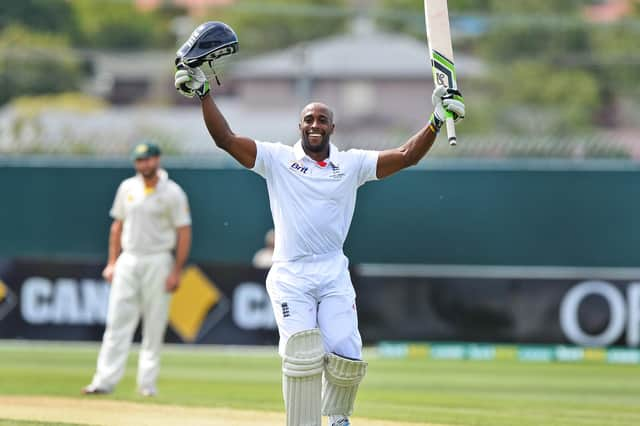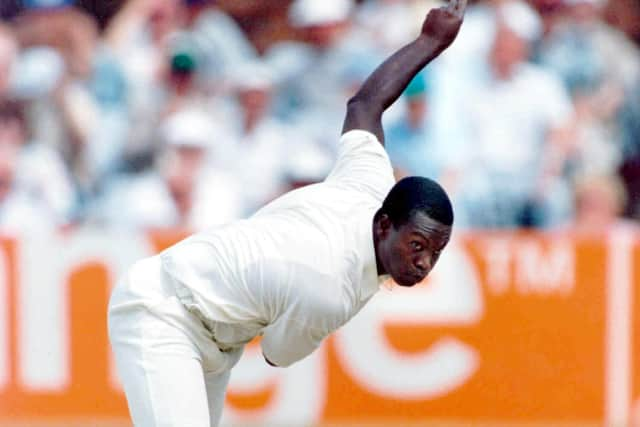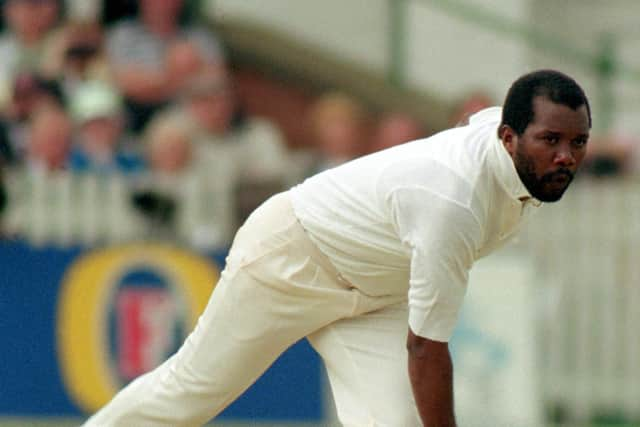Former Hampshire batsman Michael Carberry: ‘Cricket is rife with racism’


The former Hampshire batsman claims that the people in charge of the game in this country ‘don’t care about the black people in it.’
Carberry, who played at the Ageas Bowl between 2006 and 2017 - winning four one-day titles and scoring 36 centuries in all formats - also said there are no black role models in the sport for youngsters to look up to.
Advertisement
Hide AdAdvertisement
Hide AdHe is right, both from a playing, coaching and administrative point of view.


Carberry - whose parents are from Barbados and Guyana - is one of only two black players who have made their England Test debuts in the 21st century.
He was the only one prior to Caribbean-born Jofra Archer, who made his debut last summer. Carberry had made his in 2010 against Bangladesh.
That was compared to 12 black British players having made their Test debuts in the 1980s and 1990s.
Advertisement
Hide AdAdvertisement
Hide AdBack in the 1970s and 1980s, most of the all-conquering West Indies team regularly played in England.


Hampshire boasted Gordon Greenidge, Andy Roberts and Malcolm Marshall, Somerset had Viv Richards and Joel Garner, while Clive Lloyd (Lancashire), Desmond Haynes (Middlesex) and Michael Holding (Derbyshire) were also regulars.
But there were many English-qualified black players - Middlesex, for example, had four (Roland Butcher, Norman Cowans, Wilf Slack and Neil Williams) who went on to play Test cricket for England.
Gladstone Small, Phil De Freitas, David Lawrence and Devon Malcolm were others who made their England Test debuts in the 1980s. Monte Lynch made three ODI appearances in the late 80s.
Advertisement
Hide AdAdvertisement
Hide AdHere in Hampshire, Cardigan Connor made 221 first class appearances between 1984 and 1998.
Now there are hardly any black players in the County Championship, with West Indies stars such as Chris Gayle, Kieron Pollard and Andre Russell preferring to offer themselves as ‘guns for hire’ in T20 franchise events across the globe rather than play - and get paid far less for doing so - four-day cricket.
Off the field, there are no black people on the 12-strong ECB board. Only one - Baron Patel of Bradford - is from a BAME background.
The ECB’s own website states than only 11 per cent of their employees are non-white.
Advertisement
Hide AdAdvertisement
Hide AdNot many black people are actually playing recreational cricket either.
A report by Sport England entitled Sport for All, published earlier this year, found that the number of black adults involved in cricket is so small - under 1.3 per cent - as to be statistically irrelevant.
The study also highlights that while black adult involvement in cricket is low, as much as 36.2 per cent of overall adult involvement in cricket is non-white.
‘To be honest, I think cricket is rife with racism,’ he said on the Cricket Badger Podcast.
Advertisement
Hide AdAdvertisement
Hide Ad‘The issue you have in cricket is that the people running the game don’t care about the black people in it, it’s as simple as that.
‘Black people are not important to the structure of English cricket. If you look around English cricket at the moment, in the important areas of the game, where the important decisions are made, name one black man that is in that important position?
‘We’re talking about the Andrew Strauss role (ECB director of cricket), or the Ashley Giles role (Warwickshire CCC sport director).
‘Which black man has ever had the opportunity to make the big decisions on England cricket? Not one.’
Advertisement
Hide AdAdvertisement
Hide AdAgain, Carberry - who retired from cricket when he left Leicestershire in 2018 - is not wrong.
No black player has ever captained a senior England team.
Only two players from a BAME background have ever skippered the Test or ODI team.
The main one was Nasser Hussain, who was born in India and whose father was a Muslim.
The other was Mark Butcher, who captained England once in 1999 and whose mother is Jamaican.
Advertisement
Hide AdAdvertisement
Hide AdEngland have also had 11 head coaches since 1986, and all have been white.
There were 12 chairmen of the TCCB (Test & County Cricket Board) between 1968 and 1972, with only one - Raman Subba Row - from a BAME background.
Currently, only one county head coach out of 18, Sussex’s Jason Gillespie - the first cricketer to play for Australia from an Aboriginal background - is non-white.
Want another example? Only one of the eight franchises due to compete in this summer’s inaugural Hundred had employed a men’s coach from a BAME background. That was here in Hampshire where the Ages Bowl-based Southern Brave had selected Sri Lankan great Mahela Jayawardena.
Advertisement
Hide AdAdvertisement
Hide AdCarberry, who won six England Test caps, called for a radical overhaul of the leadership at the ECB to combat the issue.
‘There are no black people within the game in poignant decisions that are able to not only make decisions but also inspire the next generation,’ he stated.
‘If I was a young black boy looking to get into cricket, who am I looking at who can inspire me?
‘This is what gets me with cricket. They love their slogans, they love their little slogans. Is that dealing with the real problems? Has anyone stripped back the layers and asked the question: First of all, where does racism start?
Advertisement
Hide AdAdvertisement
Hide Ad‘Because you’ve got to know where you’ve been to know where you’re going.
“Racism doesn’t just appear, it comes from an origin. Cricket was based on colonial leadership, and that colonial way of thinking has never ever changed. You know why? Because the people running it are descendants of who? Colonial leadership.
‘As I’ve always maintained, the only way change is going to happen is at the top. You have to change, and weed out, the current lot at the top.
‘All this has happened under their watch. All the racism across the board in the game has happened under their watch.’
Advertisement
Hide AdAdvertisement
Hide AdCarberry said he was not surprised by what happened to George Floyd.
‘It’s what our community has been accustomed to for not just these last few weeks, but many many years, centuries even,’ he said.
‘It’s very distressing to see those images and at the hands of people who are supposed to be upholding justice.
‘To perform an act like that and have no emotion I think gives you a very good indicator of where life is at right now.
Advertisement
Hide AdAdvertisement
Hide Ad‘I have heard that things are improving, I have heard that rhetoric a lot, I have never thought things are improving.
‘It has never gone away since the slavery trade era.’
Carberry, who grew up in London, added: ‘I have been pulled over by police, not because I have done anything wrong, but because I’m black.
‘What you saw in Minnesota is a normal day for someone like me growing up in south London.
‘My black brothers and sisters are not surprised, this is stuff we learnt as kids. This is stuff our parents tried to guard us from.
Advertisement
Hide AdAdvertisement
Hide Ad‘I’m telling you now there were probably 100-200 cases like George Floyd in America that month. There’s a lot more George Floyds that have happened this week, this month.
‘For me, nothing has changed - it’s just another day in the life of a black man.’
Replying to Carberry’s criticism, the ECB said: ‘We truly believe that cricket is a game for everyone but understand that sadly barriers to enjoying our sport exist for many communities.
‘We have made big strides over the past few years. Our 2018 Inclusion and Diversity Plan drove investments in diversifying cricket, breaking down barriers and reforming our structures.
Advertisement
Hide AdAdvertisement
Hide Ad‘It supported reform in our approach to participation and growth with the launch of our South Asian Action Plan which showed how much we needed to do across the recreational game, elite pathway, coaching, attendance, media, communications, administration and culture.
‘This is already having positive results for all BAME groups including the installation of non-traditional playing facilities in urban areas, the recruitment of BAME female community mentors and the delivery of cricket at schools with a higher than national average representation of BAME pupils.
‘This is a lengthy process but we are committed to making it a success.
‘We recognise that need to have a whole game approach to increase diversity in governance and management structures across cricket. At the ECB we have adopted the ‘Rooney Rule’ for coaching jobs across the England teams as part of our plan to support the progression of BAME coaches.
Advertisement
Hide AdAdvertisement
Hide Ad‘We are also working with the first-class counties to support the introduction of this rule at a county level.
‘We are currently expanding our Diversity Action Plan to improve the diversity and inclusion of the ECB workforce – critically, the learnings from the Black Lives Matter movement will help inform this.
‘We know we have a long way to go until we are fully representative as a sport, particularly in relation to black communities. That’s why voices like Michael’s are so important and we will continue to listen, educate ourselves and face uncomfortable truths in order to create action and long-term change.’